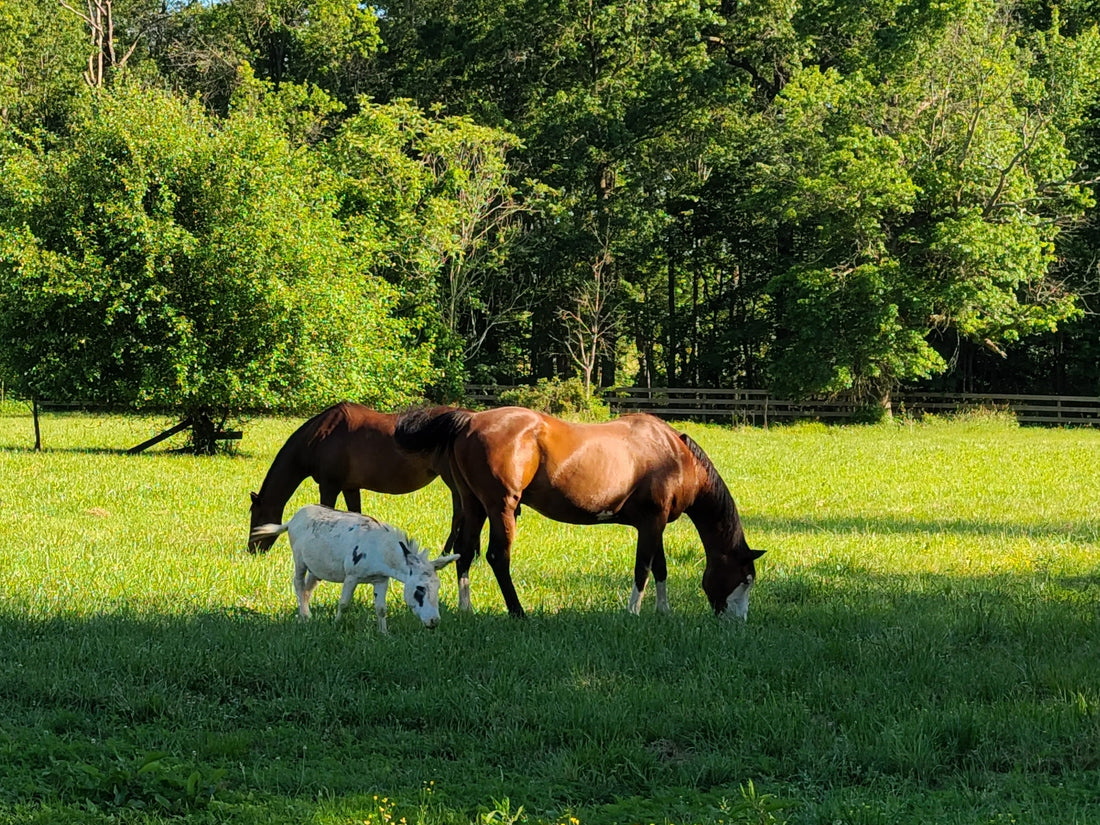Horses and donkeys are both ancient breeds that come from the family equidae. However, today they are separate species.
While donkeys and horses can be used for several similar activities, they vary greatly when it comes to intelligence, behavior, and appearance.
Donkeys vs Horses: Size
Donkeys and horses come in many different sizes. Donkeys are smaller than horses and weight about half as much as a horse: the horse weighing between 840 and 1200 pounds, the donkey between 400 and 570 pounds.
Horses are measured at the withers (shoulders), and range in size from 34 inches to 84 inches. The smallest being the adorable miniature horse, and the largest the beastly shire.

Their size often depends on the breed of the horse. Oklahoma State University lists 217 breeds of horses with names like Abyssinian and Zhemaichu.
On the other hand, there are only a few breeds of donkeys. They are measured in three separate categories: miniature donkeys, standard donkeys, and mammoth donkeys.
The smallest donkey to be recorded was KneeHi, who stood at 25 inches. The tallest living donkey is an American Mammoth Jackstock who measured 17 hands (68 inches).
Donkeys vs Horses: Appearance
Horses are majestic animals that have been bred for endurance and speed for thousands of years. Their necks are set at a high, upward angle and topped with small pointed ears. Some breeds of horses have gaits that can imitate a beautiful dance.
Donkeys portray a sense of calm and bravery. Their ears are much larger than a horses, their backs are flatter, and their necks are more muscular and thick. Donkeys have stout bodies and the long hair on their tales start lower than horses.

Donkeys vs Horses: Lifespan
Donkeys have a lifespan of 27 to 40 years. In ideal conditions they have been known to live up to 50 years. Suzy, from New Mexico reached a whopping 54 years.
Horses have an average lifespan between 25 and 30 years. It varies depending on their breed. However, it’s not uncommon for horses to reach their 40s. The oldest horse on record is Old Billy who somehow walked all the way to 62 years old.
Donkeys vs Horses: Intelligence
Horses and donkeys are both intelligent animals. However, donkeys are smarter than horses.
Donkeys received their reputation for being stubborn due to their nature of thinking through a situation. Horses will often go where directed, meanwhile a donkey will not enter an area that they deem dangerous.
Donkeys are able to recognize other donkeys and people up to 25 years later. A study conducted in 2013 by The Donkey Sanctuary showed that they are able to problem-solve and learn as well as dolphins and dogs.
Due to their empathetic nature, donkeys are becoming a popular therapy animals, especially for autistic children.
Horses intelligence is said to be similar to cats and dogs. They learn quickly, yet aren’t as good at problem solving. Fascinatingly, horses are able to recognize themselves in the mirror. They are also good at understanding human emotion and learning complex tricks and commands.

Horses are great for trick riding and different types of dance style showing. The most famous being Lipizzaner dancing.
Donkeys vs Horses: Behavior
Horses tend to be more social with people than donkeys do. Many like to approach visitors and nuzzle around in search of treats. Donkeys are curious yet cautious and hesitate to approach people they don’t know.
Horses issue greetings with a soft nicker and sound the alarm with a piercing neigh. Donkeys, no matter the situation, seem to emit an ear splitting bray. It can actually be heard up to 3 miles away in desert landscapes.
Donkeys are brave little beasts that will stand their ground and fight what is endangering them. Horses are more skittish and likely to flee, using their speed to potentially escape an attacker. Horses are fast animals, being able to run between 25 and 40 mph. Donkeys little legs carry them at a steady 15 mph. A speed that can be outpaced by some humans for a short period.
Horses are heard animals that enjoy being in large groups. Whereas donkeys often prefer the presence of one other less social areas. Though that doesn’t mean a donkey won’t interact with others if socialized properly.


